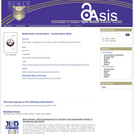
This course is designed to be a basic course in Biodiversity conservation.
- Subject:
- Ecology
- Life Science
- Material Type:
- Full Course
- Provider:
- Commonwealth of Learning
- Author:
- Graphic Era Hill University
- Date Added:
- 08/31/2016
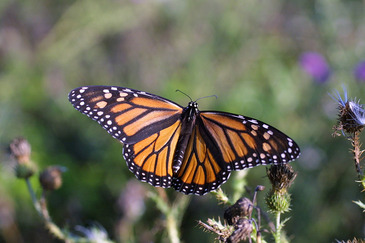

This course is designed to be a basic course in Biodiversity conservation.
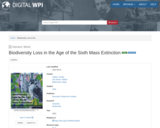
Biodiversity Loss in the Age of the Sixth Mass Extinction was co-authored by undergraduate students at Worcester Polytechnic Institute (USA) while exploring issues of extinction and conservation of biodiversity. The book highlights key interests and insights of current students in their quest to create a better world.
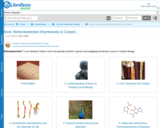
Biofundamentals™ is an attempt to build a more conceptually coherent, rigorous and engaging introductory course in modern biology.

This course is designed for advanced undergraduate and graduate students with an interest in using primary research literature to discuss and learn about current research around sulfur biogeochemistry and astrobiology.
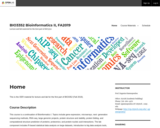
This course is a continuation of Bioinformatics I. Topics include gene expression, microarrays, next- generation sequencing methods, RNA-seq, large genomic projects, protein structure and stability, protein folding, and computational structure prediction of proteins; proteomics; and protein-nucleic acid interactions. The lab component includes R-based statistical data analysis on large datasets, introduction to big data analysis tools, protein visualization software, internet-based tools and high-level programming languages.

This interdisciplinary course provides a hands-on approach to students in the topics of bioinformatics and proteomics. Lectures and labs cover sequence analysis, microarray expression analysis, Bayesian methods, control theory, scale-free networks, and biotechnology applications. Designed for those with a computational and/or engineering background, it will include current real-world examples, actual implementations, and engineering design issues. Where applicable, engineering issues from signal processing, network theory, machine learning, robotics and other domains will be expounded upon.
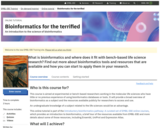
What is bioinformatics and where does it fit with bench-based life science research? Find out more about bioinformatics tools and resources that are available and how you can start to apply them in your research.
By the end of the course you will be able to:
Assess the role of bioinformatics in molecular science.
Describe the key features of primary and secondary databases.
List strategies for describing data consistently.
Identify some of the different types of data analysis that can be applied to solving biological problems.
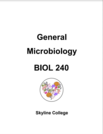
General Microbiology (BIOL 240) Lab Manual, Fall 2019 by Jing Folsom and Elsa Jimenez-Samayoa for Skyline College is adapted from Laboratory Exercises in Microbiology by Peterson & McGlaughlin and Microbiology Laboratory Manual by Nancy Pakpour and is licensed under CC BY-NC-SA 4.0.

Short Description:
Laboratory activities in this workbook are presented as chapters each of which could either be highly specialized, or generic. The approach and the level of difficulty will vary based on instructors’ preferences and more importantly availability and quality of the materials and equipment available in the laboratory.
Long Description:
Each laboratory activity follows a lecture which is envisioned to provide additional detailed information (already mostly or partially covered in a textbook assigned by a professor for Biological Anthropology theory course) regarding scheduled topics to be covered in the laboratory by offering further and in-depth guidance needed for the laboratory setting.
Word Count: 5432
(Note: This resource's metadata has been created automatically by reformatting and/or combining the information that the author initially provided as part of a bulk import process.)

This course examines the chemical and physical properties of the cell and its building blocks, with special emphasis on the structures of proteins and principles of catalysis, as well as the chemistry of organic / inorganic cofactors required for chemical transformations within the cell. Topics encompass the basic principles of metabolism and regulation in pathways, including glycolysis, gluconeogenesis, fatty acid synthesis / degradation, pentose phosphate pathway, Krebs cycle and oxidative phosphorylation.
Course Format
This OCW Scholar course, designed for independent study, is closely modeled on the course taught on the MIT campus. The on-campus course has two types of class sessions: Lectures and recitations. The lectures meet three times each week and recitations meet once a week. In recitations, an instructor or Teaching Assistant elaborates on concepts presented in lecture, working through new examples with student participation, and answers questions.
MIT students who take the corresponding residential class typically report an average of 10–15 hours spent each week, including lectures, recitations, readings, homework, and exams. All students are encouraged to supplement the textbooks and readings with their own research.
The Scholar course has three major learning units, called Modules. Each module has been divided into a sequence of lecture sessions that include:
Textbook Readings
Lecture Notes or Storyboards
A video by Professor JoAnne Stubbe or Professor John Essigmann
Problem Sets and solutions
To help guide your learning, each of these problem sets are accompanied by Problem Solving Videos where Dr. Bogdan Fedeles solves one of the problems from the set.

This course is an advanced treatment of biochemical mechanisms that underlie biological processes. Topics include macromolecular machines such as the ribosome, the proteasome, fatty acid synthases as a paradigm for polyketide synthases and non-ribosomal polypeptide synthases, and polymerases. Emphasis will be given to the experimental methods used to unravel how these processes fit into the cellular context as well as the coordinated regulation of these processes.

This course illustrates how knowledge and principles of biology, biochemistry, and engineering are integrated to create new products for societal benefit. It uses a case study format to examine recently developed products of pharmaceutical and biotechnology industries: how a product evolves from initial idea, through patents, testing, evaluation, production, and marketing. Emphasizes scientific and engineering principles; the responsibility scientists, engineers, and business executives have for the consequences of their technology; and instruction and practice in written and oral communication.
The topic focus of this class will vary from year to year. This version looks at inflammation underlying many diseases, specifically its role in cancer, diabetes, and cardiovascular disease.

This course covers sensing and measurement for quantitative molecular/cell/tissue analysis, in terms of genetic, biochemical, and biophysical properties. Methods include light and fluorescence microscopies; electro-mechanical probes such as atomic force microscopy, laser and magnetic traps, and MEMS devices; and the application of statistics, probability and noise analysis to experimental data. Enrollment preference is given to juniors and seniors.

In this course problems from biological engineering are used to develop structured computer programming skills and explore the theory and practice of complex systems design and construction.
The official course Web site can be viewed at: BE.180 Biological Engineering Programming.
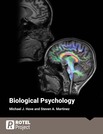
Biological psychology is the study of the biological bases of behavior and mental processes. It explores how biological factors like genes, hormones, neurotransmitters, and brain structures influence psychological components like thoughts, emotions, memories, and actions. This free and open textbook provides a wide ranging and up-to-date introduction to the main topics and methods of biological psychology.

Biology is designed for multi-semester biology courses for science majors. It is grounded on an evolutionary basis and includes exciting features that highlight careers in the biological sciences and everyday applications of the concepts at hand. To meet the needs of today’s instructors and students, some content has been strategically condensed while maintaining the overall scope and coverage of traditional texts for this course. Instructors can customize the book, adapting it to the approach that works best in their classroom. Biology also includes an innovative art program that incorporates critical thinking and clicker questions to help students understand—and apply—key concepts.
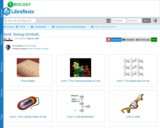
It has always seemed to me that the many parts that make up the subject of biology are related to each other more like the nodes of a web than as a linear collection of independent topics. So I believe that the power of hypertext will be better suited to learning about biology than is the linear structure of a printed textbook. Another disadvantage of printed textbooks is the inevitable delay between the time that new advances in biology are reported and the time that they can become incorporated in a printed book (often several years). Material here can be updated promptly. So although some of this information has been drawn from the sixth edition of the author's text Biology published in 1994 by Wm. C. Brown, every effort has been made to adapt the material to the opportunities provided by an online text.
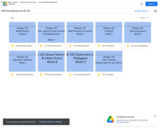
Slides for a 10 week course.

Word Count: 105063
ISBN: 979-8-9859684-2-2
(Note: This resource's metadata has been created automatically as part of a bulk import process by reformatting and/or combining the information that the author initially provided. As a result, there may be errors in formatting.)
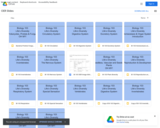
Slides for Biology 103.